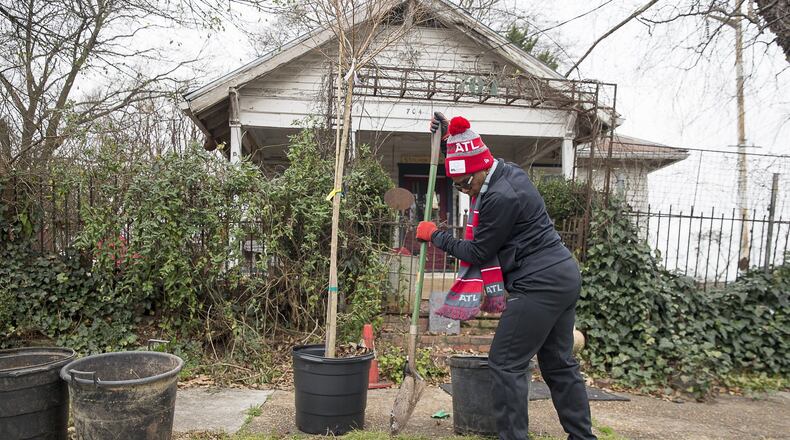By now, drivers along English Avenue and Donald Lee Hollowell Parkway have surely noticed the crape myrtles — 22 of them — framing the Salvation Army Bellwood Boys and Girls Club.
They might not look like much now but, oh, come spring when they flower.
This section of Atlanta’s West End, known more for drug deals and its murder rate than tree-lined streets, will appear a little less hardened. Not only will it look prettier, but its hard edges and surfaces will soften and residents will, if they haven’t already, breathe a little easier.
And so before the first seedling was in the ground Tuesday, Joshua Dickerson, executive director of the Salvation Army Boys and Girls Clubs of Greater Atlanta, had one word for the effort: major.
“You’re helping change the image of this community,” he said.
The tree planting at Bellwood, the 12th of 15 planned across metro Atlanta, marked the beginning of NFL Green Week, begun in 1994, when the Cowboys defeated the Bills at the Georgia Dome. The final two projects will happen here after the big game and then in Miami, the host city for Super Bowl LIV.
The effort is the brainchild of Jack Groh, who realized big events such as the Super Bowl not only create lots of waste and use enormous amounts of energy but they offer opportunities, too.
“When we started, we just wanted to reduce the environmental damage,” he said. “Then we decided why not go further and leave things better than we found them.”
Groh and his wife, Susan, head the NFL Environmental Program, which partners with community groups to reduce the environmental impact of the Super Bowl and leave a positive “green” legacy in the host community.
RELATED: NFL seeks 'wow factors' around Atlanta game
According to Susan Groh, the NFL — along with its partners, Verizon, Trees Atlanta and the Atlanta Super Bowl Host Committee — has planted nearly 450 trees around metro Atlanta since October when it planted its first 40 trees in Castleberry Hill. Volunteers will plant another 50 trees at two schools in Doraville this weekend.
Not only are trees great for the environment, but they also beautify neighborhoods and provide shade, and studies show that the more green space children have, the more likely they are to go outdoors and play, Susan Groh said.
In addition to planting trees, volunteers have planted community gardens, expanded the Browns Mill urban food forest and installed a pollinator garden at Zoo Atlanta.
“We do this every year, but it’s a real community effort that extends to the mayor’s office,” Susan Groh said.
The NFL, the host committee and Verizon contributed some $80,000 to complete the metro Atlanta projects. And they are not done.
Come Thursday, they will host hundreds of local school children at the Infinite Energy Center in Duluth in what is being billed as Super Kids-Super Sharing.
Students from preselected schools will drop off and help sort donated books, pieces of sports equipment, school supplies and games they’ve collected, then enjoy play activities provided by the Atlanta Falcons.
The Verizon Foundation will present a grant of $18,000 to the acclaimed Ron Clark Academy. The grant will fund a peer-to-peer violence awareness program that tackles issues of bullying.
RELATED: What is Super Bowl Live?
Beginning at 1 p.m., designated schools and organizations that serve local children in need will select the books, sports equipment and other items they can use.
Super Kids started in Atlanta in 2000. In honor of its 20th anniversary, Verizon is partnering with the NFL and the Arbor Day Foundation to plant more than 20,000 trees in Georgia's Sandhills Wildlife Management Area.
This popular community initiative is implemented in every Super Bowl host community and over the years has collected hundreds of thousands of books, pieces of sports equipment and school supplies to help local children in need, the Grohs said.
Finally on Saturday, a Super Bowl LIII E-Waste Recycling Rally, also sponsored by Verizon, will kick off at the Cherokee Avenue entrance of Zoo Atlanta.
Residents are encouraged to bring their e-waste — computers, printers, monitors, cellphones and televisions — for recycling.
The first 250 families to bring items will receive a gift bag, and all who drop off items will receive a discount for Zoo Atlanta admission.
“Responsibly recycling cellphones and other electronics helps to protect the natural environment of gorillas and other animals by reducing the amount of habitat disturbed by mining for the minerals used in these items,” Susan Groh said.
About the Author
The Latest
Featured






